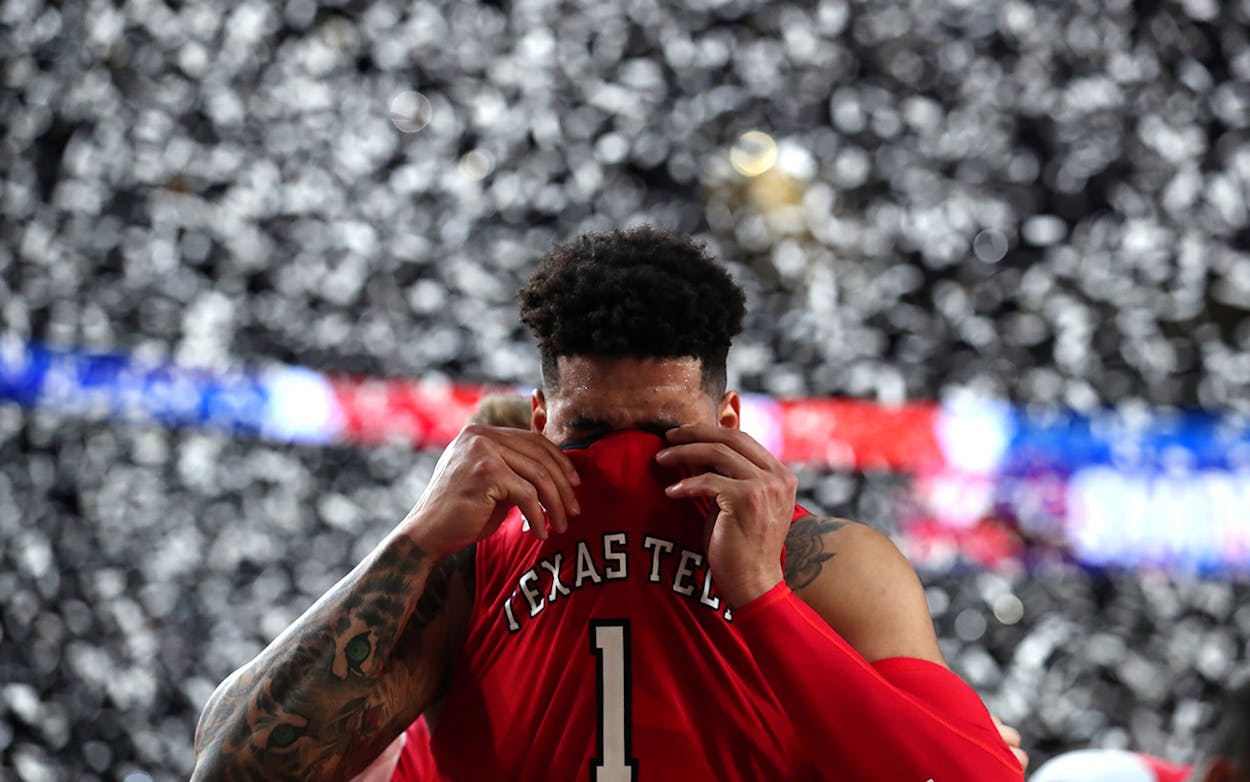It’s never fun to lose. That’s true if you’ve been bleeding red and black since childhood, suffering through the bad years, and enjoying every second of Texas Tech men’s basketball’s performance in this year’s NCAA tournament. And it’s true even if you just hopped on the bandwagon in the final week of the team’s improbable journey to the national championship game. By Monday, seemingly the entire state was on board—as far from Lubbock as San Antonio, highway signs were adorned with “Go Tech” messages, while in the city itself, scooter companies removed their devices from the streets, fearful that jubilant fans might set them ablaze.
But by the final buzzer late Monday night in Minneapolis, there was nothing to celebrate in Lubbock. The game turned on a questionable replay review of a ball going out of bounds, with possession awarded to Virginia, who were ahead by two points with a minute left in overtime. The gap proved insurmountable, and in the end, as the Red Raiders fouled relentlessly in a last-ditch attempt to even the score, Virginia won by eight to win their first national title ever (it was the first men’s championship game in forty years in which neither team had won before).
But while the mood in Lubbock might not be celebratory as Monday turns to Tuesday, when the disappointment fades there will be a lot to recall fondly when considering this season—and even this final game, unsatisfying conclusion aside. The Red Raiders, who weren’t ranked when the season started, played with immense heart, overcoming multiple double-digit deficits to get ahead of the favored Cavaliers. They got off to a slow start in the first half before taking a lead, which the team surrendered going into halftime; in the second half, they similarly struggled, taking their first lead only in the final moments. They spent most of the game looking like a team that was beaten—according to FiveThirtyEight, Virginia’s win probability hovered close to 90 percent for most of the second half—but fought their way back again and again, displaying an uncommon resiliency.
It would have been magical if Jarrett Culver—the hometown Lubbock kid who catapulted to superstardom during the tournament—had sunk his shot with one second left to play in regulation, but this wasn’t a magical team. They showed their heart in defeat, which makes for a bittersweet feeling at the end of the night—but the reason we care about sports isn’t because a single championship validates our existence; it’s because we can use what happens during the game as a metaphor for the things we care about. If being resilient in the face of adversity is a trait we admire, then it doesn’t matter what the replay review determines about Davide Moretti’s pinky finger. If refusing to give up when you feel defeated is something we aspire to, then the fact that sometimes you can refuse to give up and still lose only tells us that the reward is in the trying, not in the outcome.
All of this is the point of sports. It would be a weird sort of fun to see footage of Tech students roaming the streets of Lubbock chanting and screaming, flipping over cars and setting scooters on fire. The catharsis of the final moment, when the buzzer-beater goes in or the defender cradles the rebounded ball in his arms as the last seconds tick away, is its own reward. But sports teach us to accept that the catharsis doesn’t always come, and that when it doesn’t, we have to find other sources of satisfaction.
For Tech fans, that might be slow in coming. For bandwagoners like me, it’ll fade in another twenty minutes or so, and I’ll be left with the memory of Culver dusting De’Andre Hunter, one of the best defenders in college basketball, with 35 seconds to go in order to give the Red Raiders the lead—a highlight for the ages no matter the final score.
There are championships to celebrate in Texas. On Sunday, Baylor won the NCAA women’s tournament, its third such victory under head coach Kim Mulkey. On Thursday, UT won the Men’s National Invitational Tournament, and TCU made it to the Final Four of the Women’s Invitational before being knocked out. (It’s not even just basketball—UTRGV defeated Harvard to successfully defend its title in the college chess Final Four!) And a championship, especially at a major level, can mean big things for the players, coaches, and programs that accomplish it. Mulkey could end up becoming the first woman to coach a Division I men’s team, and center Kalani Brown is a lock to be an early pick in the WNBA draft. A win in the consolation tournament could fire up UT for the 2019-20 season. We can be inspired by wins, but we can learn from losses.
Cliches become cliches for a reason, and there’s no sports cliche more etched into the core of the game—any game at all—than the one by famed sportswriter Grantland Rice:
For when the One Great Scorer comes to mark against your name
He writes—not that you won or lost—but how you played the Game.
The Red Raiders lost, but they played with dignity and resolve. You can complain about the replay review, or about Senator Ted Cruz continuing the unfortunate tradition of Texas politicians celebrating high-stakes sports contests prematurely—but to do so ultimately misses the point. Sometimes, as the Lady Bears did, you win. Sometimes, as the Texas Tech men’s team did, you lose. No one on the team needs to wonder if he could have played harder, though, or tried to do more. They gave it everything.
- More About:
- Sports
- Texas Tech








